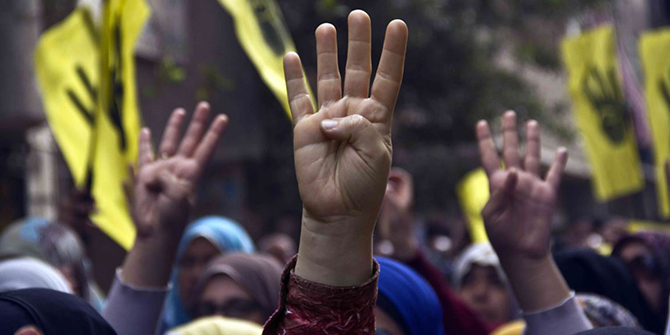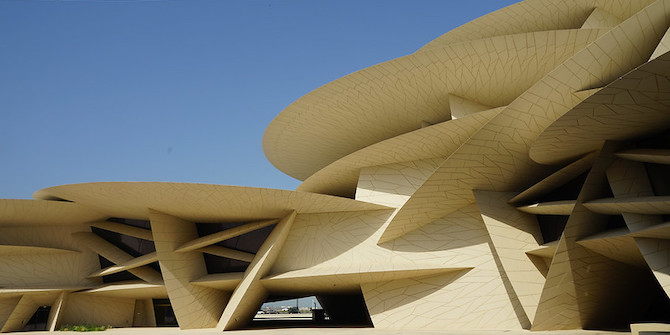by Courtney Freer
This memo was presented at a workshop organised by the LSE Middle East Centre on ‘Mapping GCC Foreign Policy: Resources, Recipients and Regional Effects‘ on 7 October 2015.
Claims about Qatar’s tilt toward the Muslim Brotherhood often centre on the state’s foreign policy. The notion that it has managed to squelch Brotherhood activity at home by promoting the organisation’s interests abroad has become particularly popular. Qatari leadership was certainly public about its willingness to accept Brotherhood movements that came to power during the Arab Spring. Former Prime Minister and Foreign Minister Shaykh Hamad bin Jassim al-Thani, in a December 2011 interview, said that Islamists were likely to win elections in several countries that experienced political upheaval and that ‘we shouldn’t fear them, let’s cooperate with them.’ Promoting a similar standpoint, Amir Shaykh Hamad (quoted in Lina Khatib, ‘Qatar’s Foreign Policy: The Limits of Pragmatism’, International Affairs 89, no. 2 (2013), p. 424) said of Islamist groups in 2011: ‘I believe you will see this extremism transform into civilian life and civil society.’ While not open endorsements, such statements reveal a degree of trust in Islamist organisations. Beyond rhetoric, Qatar’s actions abroad, particularly during the Arab Spring, also indicated support for Islamist groups in Egypt, Libya, Syria, and Tunisia.
What is most often overlooked in the scant existing literature concerning links between Qatar and the Muslim Brotherhood is the role of political Islam inside Qatar itself, which has not been institutionalised since the Brotherhood completed its dissolution in 2003. Nonetheless, because Qatar is ‘a naturally conservative society’, policies that are motivated by religiosity or adherence to tradition are often considered evidence of Brotherhood infiltration. As Qatari Hassan al-Ibrahim explained in an October 2013 interview, ‘Muslim Brotherhood influence is informal, not institutionalised’, making it difficult to trace. Even when the group had an organised structure inside Qatar, its ranks were divided over how they would adapt to an environment with little space for political participation. By retaining its shapeless form, the Qatari Brotherhood has maintained its appeal as an ideology without infringing on the government’s prerogative.
A Brief History of the Brotherhood inside Qatar
Egyptian writer Mustafa ʿAshur divides the Muslim Brotherhood’s history in Qatar into three stages. First in the mid-1950s, Egyptian Brotherhood members arrived, eager to escape Gamal Abd al-Nasir’s crackdown. Many of them worked in the education sector, influencing the development of curricula and thus a new generation of Qataris, while also benefitting from support of al-Thani family who hoped to stem the tide of Arab nationalism. Secondly, the 1970s saw Qataris studying in Egyptian universities (among them former Brotherhood Supreme Guide Jassim Sultan) bringing Ikhwan ideology back to Qatar after completing their studies, eager to create an indigenous organisation. As Islamist influence increased, sympathisers insisted that an official group was needed to oversee Ikhwan activities. The Brotherhood affiliate, founded in 1975, was, in the words of Jassim Sultan, ‘just collaboration, a simple thing’. Thirdly, Syrian Brotherhood members came to Qatar at the start of the 1980s following the Assad regime’s violent crackdown. Throughout these various phases, the group maintained its focus primarily on daʿwa, the intense study of shariʿa, the organisation of sporting activities, and integration into the community. The Qatari Brotherhood also hosted a series of educational, cultural, and athletic activities. Still, the organisation as a whole remained only loosely organised and relatively small.
Qatar’s Brotherhood entered a phase of internal discussion about its role in the country beginning in the 1980s, which ended with a vote in favour of the organisation’s dissolution in 1999. Curiously, discussion about the Qatari government’s preference for the Brotherhood emerged only after voluntary dissolution, demonstrating that any Ikhwan influence has not emanated from a structurally powerful Brotherhood. The process of dissolution, about which very little is known, was completed in 2003. Ultimately, the Brotherhood in its traditional form was considered inappropriate for Qatar. The Brotherhood instead chose to exist as ‘an Islamic renaissance movement, rather than remain in the organizational hierarchy’. If it had had widespread popular support, it is unlikely that the Qatari Ikhwan would have willingly dissolved. As a wealthy Wahhabi state with limited means of political participation and strong existing tribal social links, Qatar does not provide an easy environment for Brotherhood function.
Assessing Brotherhood Influence at Home and Abroad
Qatari government support for Brotherhood branches today is informal, in the form of personal relationships fostered through social ties and majālis, involving high-ranking members of the cabinet and the Brotherhood rather than any institutionalised strategy. With decisions made by very few people at the head of the government, the lack of institutionalised capacity suggests that any tilt toward the Brotherhood in foreign policy is not due to an ideological leaning or structural linkage and in fact may change depending on the person (or people) making foreign policy decisions.
Aside from being highly personalistic, the Qatari government’s backing of Brotherhood movements overseas is meant to advance the country’s influence globally, rather than to spread a specific ideology. If it truly harboured an Islamist agenda, the Qatari government would use its ties to such groups to influence domestic politics, where Islamism has a degree of grassroots support. Instead, pragmatism overrides ideology. In the view of Gerd Nonneman, ‘[t]he Qatari government has and continues to behave internationally not out of an ideological commitment but out of a pragmatic assessment of how the region functions. Islam is important; the Muslim Brotherhood is the biggest group among Islamists and is considered to be effective, seen as not corrupt.’
Related to Qatar’s willingness to engage with the Brotherhood to boost its international standing is the leadership’s desire to distinguish itself from Saudi Arabia. This was particularly important for Shaykh Hamad, as the Saudis backed a coup attempt against him in 1996. Backing the Brotherhood, or at least not cracking down on it, was a way to distinguish itself from the Kingdom, in something of an ‘enemy of my enemy is my friend’ arrangement. While Qatar has considered the organisation an important regional player, ‘Saudi Arabia has traditionally seen the Muslim Brotherhood, an Islamist group with political ambitions, as a potential political challenger, and thus has been cautious in its dealings with the group’ (Khatib, p. 422).
By hosting Egyptian Brotherhood luminary Shaykh Yusuf al-Qaradawi, as well as by founding Al Jazeera and launching the websites IslamOnline and IslamWeb, Qatar has become ‘the hub of media production for Arabic-speaking Muslims’ (Bettina Graf, ‘Sheikh Yusuf Al-Qaradawi in Cyberspace’, Die Welt des Islams 47, no. 3-4 (2007): pp. 406-407). Having created a space for influential Islamists, Qatar has been at the forefront of promoting popular Islam, rather than attempting to stem the tide of popular movements that hold appeal among much of Qatar’s national population. The recent foreign policy tilt towards the Muslim Brotherhood, then, reflects attempts to co-opt the organisation for its own ends, rather than to advance the group’s ideology.
In the aftermath of its controversial support for the failed Brotherhood regime in Egypt, Qatar has been dubbed ‘a mini Ikhwanistan’. Despite international speculation about its ties to the Brotherhood, however, to the extent that Qatar has a major foreign policy goal it is ‘to promote what they call the ‘elements of strength’ of the Arab nation, that’s their vision – meaning Islamists and Arab nationalists [….] They [the Qataris] think they have a historic responsibility to strengthen these elements in Arab societies. Tactics change […] but the broad vision is there.’ (Muhammad al-Mukhtar al-Shangiti, quoted here.) For a small country, Qatar’s active foreign policy has been a source of pride, as it is considered to defend the Arab and Islamic world. Part of Shaykh Tamim’s vision has involved boosting the role of Islam more generally, promoting something of Muslim nationalism. In a February 2015 opinion piece written in The New York Times on the eve of his state visit to the United States, Tamim explained, ‘I know that many in the West look at the terrorist threat and say that the problem is Islam. But as a Muslim, I can tell you that the problem isn’t Islam — it’s hopelessness.’
Qatar’s rulers endeavour to portray themselves as promoters of the Islamic faith by framing debate around Islam rather than attempting to diminish its presence or importance. By fostering ‘a prevailing state of tolerance’ and embracing some Islamist causes, the Qatari government has allowed for limited expression of Islamism within its borders and through its policies abroad.
Other memos presented at the workshop
- Pejman Abdolmohammadi, ‘GCC-Iranian Relations and Changes in Iranian Foreign Policy towards its Neighbours’
- Suliman Al Atiqi, ‘GCC Foreign Policy Projections in the Palestinian-Israeli Conflict: A Comparative Analysis of Saudi Arabia & Qatar’
- Will Bartlett, James Ker-Lindsay, Kristian Alexander and Tena Prelec, ‘UAE Policies towards the Western Balkans: Investment Motives and Impacts’
- Karen Young, ‘The New Politics of Gulf Arab State Foreign Aid and Investment: Evidence from the UAE Intervention in Egypt’
- Christian Henderson, ‘The UAE’s Nexus State: Logistics, Transport and Foreign Policy’







